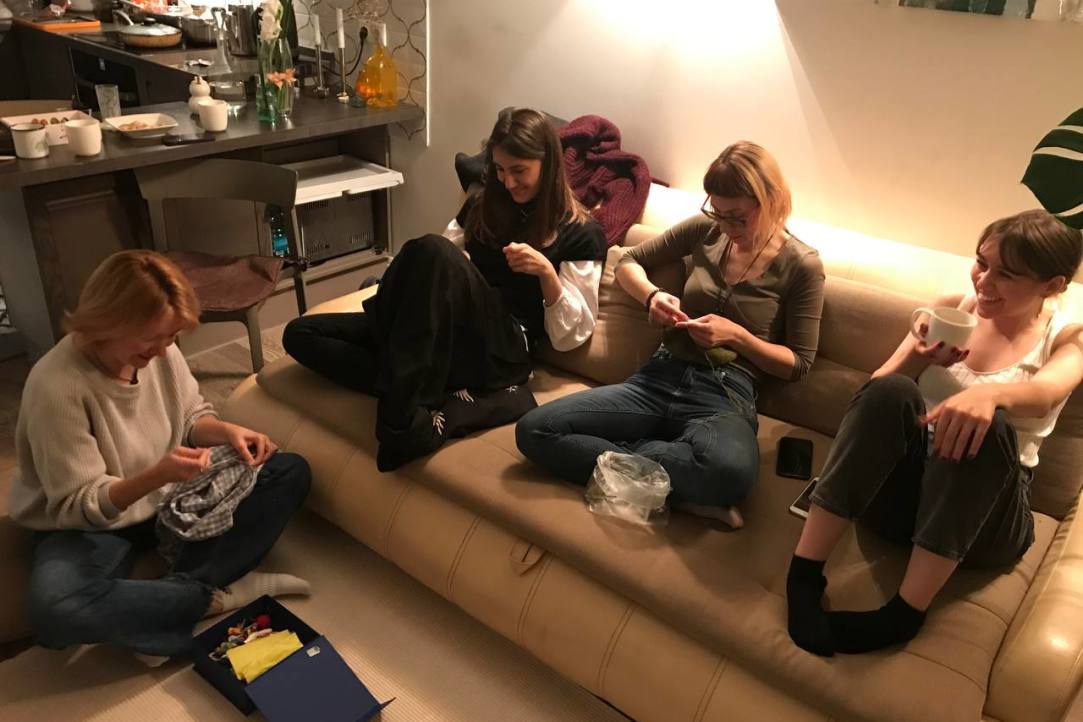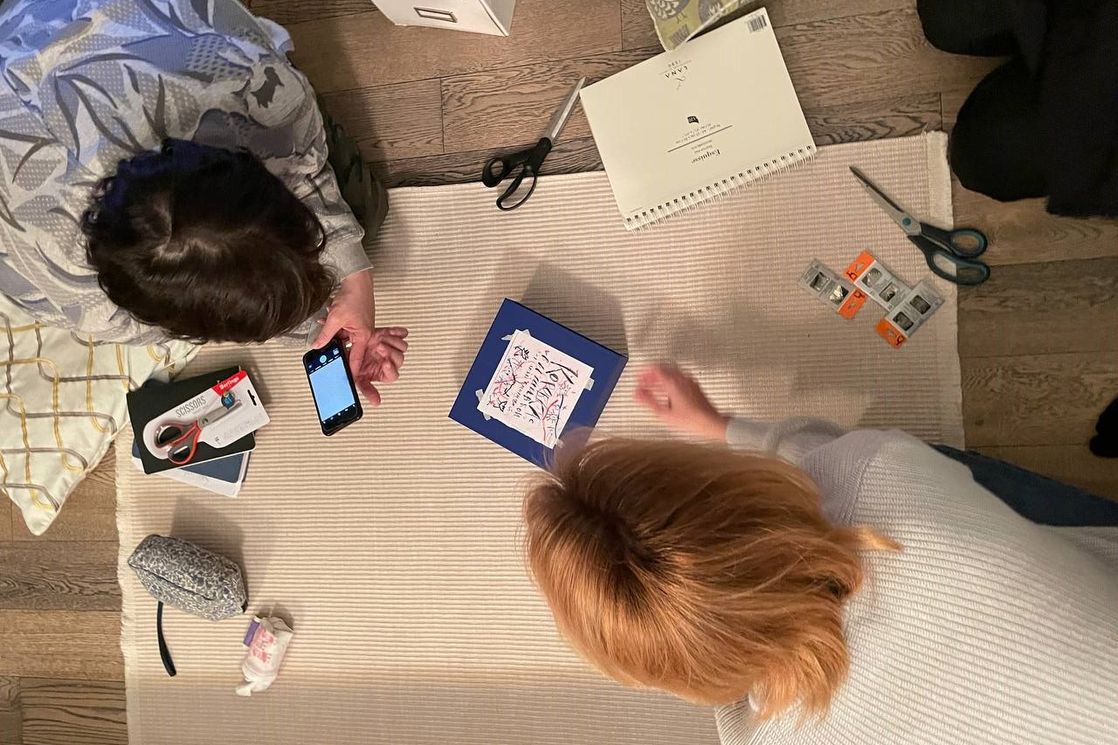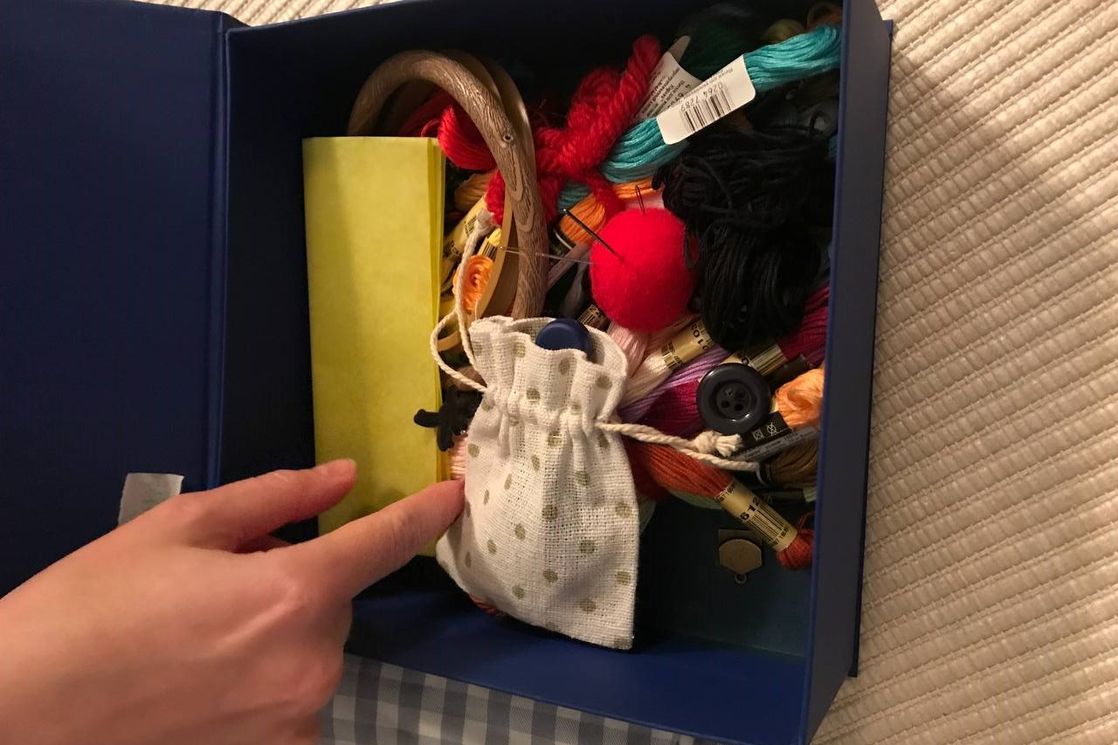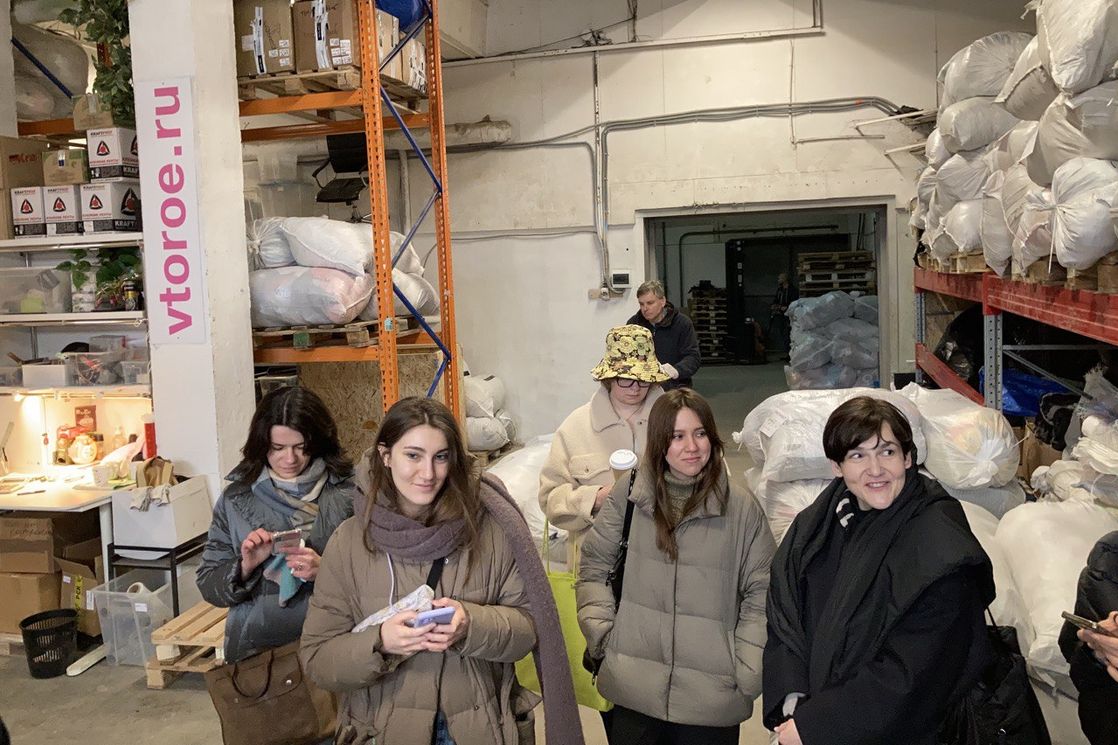HSE University Launches Study at GES-2 Cultural Centre

The MendiT Research Lab, based at the HSE University Doctoral School of Arts and Design, will become a resident of the GES-2 Cultural Centre for a month from June 5th. The researchers will introduce members of the urban community to the lab and explore the practices of mending clothes together with them. Some of the lab participants told the HSE News Service what it's like to be searching for a method and object of research.
The MendiT lab explores technology for mending clothes and slow fashion based on principles of conscious consumption and concern for the environment.
Mending is widely understood by researchers, and interest in the topic of clothing care and sustainability in science have increased in the last few years. The focus on historical (eg Soviet) practices of mending clothes is currently of less interest to researchers since Soviet repair was a forced measure, an attempt to save money on purchases by mending clothes when needed. It was largely invisible: a good seamstress had to hide her efforts. Today there is a wave of growth in visible repairs, where the patches don't pretend to be anything else, but instead all the effort is to keep the thing intact in its entirety. MendiT participants are interested in where the enthusiasm for mending clothes comes from these days.

Although it is primarily a study of clothing practices, the research field is interdisciplinary. At the point when the laboratory was established, scientists were already in contact with colleagues researching, for example, the history of medicine. Surgery and clinical therapies are also a kind of repair. Mending proved to be an ideal setting to employ this kind of interdisciplinary approach.
Liudmila Alyabieva, Project Manager, Academic Director, Doctoral School of Arts and Design, Associate Professor, Faculty of Communications, Media, and Design/HSE Art and Design School
‘Clothing care became an interesting issue to me during the pandemic. Mending and maintaining existing clothing is a completely new research topic in the study of fashion. While fashion is traditionally future-focused, here we are offered a totally different frame of reference and temporality—the preservation and maintenance of the existing.

There are several levels of work in the laboratory. The first one is meetings with foreign colleagues. They present papers or share their research findings at the lab workshops. The second level is going out into the field to do research. During the lab work, the researchers visited Uchma and Kolomna, as well as the GULAG History Museum and the Second Wind Foundation in Moscow. The researchers are also planning a trip to the Russian North. All trips are considered by the participants to be an interesting experience in the search for a method and object of research’.
Galina Ignatenko, Researcher of Embroidery in Contemporary Art, PhD student at the Doctoral School of Art and Design, HSE University
‘One of our first meetings as a research group took place in the town of Uchma. We went to the Museum of Holes and Patches, where all our scepticism about whether mending is worth researching immediately dissipated. We saw how many stories lie behind each hole and realised that there was definitely something to study here. After Uchma, I changed the topic of my PhD thesis. Instead of avant-garde fashion, I will study the theme of women's needlework in contemporary Russian art.’
Irina Balakshina, Fashion and curation practices researcher, Doctoral Student, HSE Art and Design School
‘Our first trips were exploratory. We wanted to understand what experiences with clothes, darning, and memory work existed in different communities. Each trip was unlike the previous one. In Kolomna we visited a silk factory that the locals want to restore. Its story illustrates the importance of preserving lost heritage, about how holes in history can be patched up by recreating silk production. There are more subtexts here than just mending clothes.’
Natalya Goncharova, Master’s degree Programme Graduate, School of Art History, Russian State University for the Humanities (RSUH)
‘To all the questions we ask about mending, I wouldn’t like to give a precise answer: what matters here is the process. It seems that all scenarios that refer to mending have one thing in common: a quest for authenticity. Obviously, in today's world with its multitude of halftones and shades of fakery, there is a need for something real. The hole is real. Trauma is real. Any treatment, any repair, is real. I do carpentry, and some of my work is not about restoration, but about upcycling (recycling) old items into something new. It turns out that, in terms of aesthetics and meaning, it's very important to a lot of people.’
The third level of the lab's work is practical. Since the founding of the Doctoral School of Arts and Design, the lab has been looking for formats that combine theory and practice, and with this theme of mending, they have achieved this.
Liza Kuznetsova, Fashion Theory Researcher, Master's Student of the ‘Fashion Industry: Theories and Practices’ programme, the Moscow School of Social and Economic Sciences
‘During the course of our research, we discovered the repair café format. People come there with things they need repaired. They are helped by those who are more experienced and have the skills to mend things, these people get tools to work with. We found out that it's not just a European story, there is a similar place in Perm, too. People are fascinated by it. The trend towards sustainability is taking hold of us, and we are looking for a way to introduce this experience in a public space. Our research is undoubtedly useful.’

In June, MendiT Research Lab will become a resident of GES-2, a community-oriented cultural centre. The Lab has always been interested in finding an outlet outside of the closed research community. Plans are under way to hold a workshop in a ‘stitch-n-bitch’ format, which combines creativity and conversation. Together with invited participants, the plan is to create a panel-installation from repaired clothes. The researchers are not interested in the finished statement, but in the process, because mending is about caring and cooperating. Through a special form, they plan to collect stories about holes and mending things, and to present the collected texts at the end of the residency period. This is a dialogue on three levels: firstly, among academics, secondly between academics and the community, and finally between practitioners and the objects they work with.
Other ideas include producing publications and organising conferences. MendiT members are now working on material for the Fashion Theory magazine, an issue of which will be devoted to mending. This will be in an open essay-research format of ‘repair diaries’, where each author presents his or her own vision, making mending-related notes. The launch of the issue will take place at GES-2 at the end of June.
Asiya Aladjalova, Fashion Historian, Master's student of the ‘Fashion Industry: Theories and Practices’ programme, the Moscow School of Social and Economic Sciences
‘Each of us has a different vision and individual goals regarding mending. Some of us prioritise research, others prioritise practice. There are several directions in the work: passing on your skills, opening up a cultural institution and writing a study.’
‘It seems to me that the very issue of mending clothes, being a supportive practice, inspires gestures of solidarity and mutual assistance: we receive letters from foreign colleagues who support scientists who find themselves in isolation. That's about mending, too. I would like to believe that the motto of our laboratory can be applied to the situation we find ourselves in today, and “we can mend it!”’ says Lyudmila Alyabyeva.
Irina Balakshina
Doctoral Student, HSE Art and Design School
Galina Ignatenko
See also:
Zaruhi Hakobyan Shortlisted for HSE Alumni Awards
Zaruhi Hakobyan, master’s graduate of the HSE University Faculty of Economic Sciences and research scientist at the University of Luxembourg, is involved not only in research but also in organising academic events for young scientists and students. As a foreign graduate of HSE University, Zaruhi was nominated for the HSE Alumni Awards ‘for her tireless enthusiasm in popularising economic science, teaching, and research at the international level’ and made the shortlist.
Fashion for Strong Women: Emancifashion Exhibition Takes Place at HSE University
In early November, the Emancifashion exhibition, dedicated to the representation of women in art and fashion, took place at HSE University in Maly Trekhsvyatitelsky Pereulok. The event, organised by first-year students from the HSE Media Communications programme, featured works created by students from the Fashion Design programme of the HSE Art and Design School.
HSE Art and Design School in St Petersburg Launches Fashion Design Track
Starting from 2024, applicants to the HSE Art and Design School in St Petersburg will be able to choose a new track in Fashion Design—something unique to the city’s fashion industry. Students of the new track will study according to a special programme developed by the HSE Art and Design School. The track has already been successfully tested on the Moscow campus and has shown impressive results, judging by the careers of its graduates.
‘Studying at HSE Was a Chance for Me to Get to Know Some Supportive Seniors, Knowledgeable Professors, and Wonderful Friends’
On August 4, 2023, a pre-defence of the thesis on ‘Refugee-Host Community Conflict over Assimilation, Integration, and State Legitimacy: The Case of Rohingyas in Bangladesh’ by Md. Reza Habib will be held at HSE University. The preliminary defence will take place at a joint meeting of the HSE School of Sociology and the International Laboratory for Social Integration Research. Md. Reza Habib shared his experience of studying and preparing his PhD with the HSE News Service.
‘Our Graduates’ Task Is To Show Themselves as Designers’
In mid-July, HSE Art and Design School hosted the graduate fashion show for the Bachelor’s and Master’s programmes in the Fashion Design and Fashion Brand Creation pathways. Guests saw 20 collections from young designers, with each of them reflecting on an exciting topic, while creating unusual images from a variety of materials.
‘At HSE University, We Receive Substantial Support for Our Research’
Wenrui Zhang, from China, is a recent graduate of theMaster’s in Economics and Economic Policy at the HSE UniversityFaculty of Economic Sciences. Having successfully defended his master’s thesis on the impact of COVID-19 on the incomes of vulnerable groups, Wenrui has set his sights on publishing his research and enrolling in adoctoral programme at the university. The HSE News Service interviewed Wenrui about his achievements so far and his goals for the future, and also spoke to Prof.Elena Kotyrlo, his academic supervisor.
‘I Hope to Make Meaningful Contributions to the Academic Community’
Why do international students at HSE University decide to pursue a career in academia? What fields in economics are relevant to PhD students? Richard Asiamah from Ghana and Alesya Bukreeva from Uzbekistan are current master’s students at the Faculty of Economic Sciences, but have already received scholarships from the faculty to continue their studies as doctoral students at the university. Below, they share their experiences, while Denis Melnik, Academic Director of the Doctoral School of Economics, suggests some tips for the application process.
1,700 International Participants Named Winners of Open Doors International Olympiad
On March 16, the results of the Open Doors International Olympiad for master’s and doctoral applicants were announced. The competition is organised by the Association of Global Universities with the support of the Ministry of Education and Science of Russia and the Federal Agency for the Commonwealth of Independent States Affairs, Compatriots Living Abroad, and International Humanitarian Cooperation (Rossotrudnichestvo). HSE University is one of the Olympiad’s organisers and the site of its distributed project office.
‘An Avatar Is an Image of a Posthuman’: Mediacosm Held at HSE University
On February 16, the sixth Mediacosm conference was held. The event traditionally dedicated to discursive and non-discursive ways of presenting the cosmos through media, fashion and music was organised by the HSE Faculty of Creative Industries.
‘My PhD Taught Me about Life, Professionalism, Research, and Controlling My Emotions’
Wai Yan Phyo Naing first came to HSE University from Myanmar to enrol in a master’s programme at the Faculty of World Economy and World Affairs in 2015. After graduation, he decided to pursue a PhD at the Doctoral School of International and Regional Studies. On February 16, 2023, he successfully defended his dissertation on ‘Evolution of Myanmar’s Policy Towards China (1988–2020)’.


